Sarawak’s agricultural and ecological wealth has always been a cornerstone of its identity and economy.
From its thriving pepper and rubber industry to its diverse rainforests, the state is a testament to nature’s abundance.
Committed to safeguarding the state’s agricultural and natural systems, the Plant Biosecurity & Quarantine Division of the Sarawak Department of Agriculture steps in.
Often working behind the scenes, this division enforces rigorous checks on agricultural cultivations and import of plants.
Yet, despite its importance, plant biosecurity remains a topic that many are unfamiliar with. Misconceptions about the division’s role as an obstacle to agricultural trade (or perhaps as strict enforcers who indiscriminate confiscate fruits and various organic products from people at airports) – often overshadow its critical contributions to Sarawak’s sustainable future.
This article aims to shed light on the division’s work, highlighting its relevance to farmers, businesses, and communities, while addressing the challenges it faces and how the public can contribute to its mission.
The Role of Plant Biosecurity in Managing Plant Virus Disease Epidemics
Plant biosecurity, in essence, is a holistic system designed to mitigate threats from pests and diseases that impact biodiversity, agriculture, and human health.
This system covers food safety, transboundary introduction of diseases and pests, and release of living modified organisms (LMOs) and their products (e.g. genetically modified organisms or GMOs).
What makes biosecurity management particularly challenging is how easy it is to introduce biosecurity hazards at any step in the food chain.
Any breach between the production and consumption stages can (and has) result in adverse health consequences to individual or multiple biosecurity sectors.
For developing countries, the biosecurity systems remain arguably rudimentary in operations or manpower, thus leaving them more susceptible to such breaches.
As such, monitoring, surveillance, and control systems at the borders and in the food chain of an agricultural system determine its resistance and food security in the long term.
The Plant Biosecurity and Quarantine Division in Sarawak: An Overview
In Sarawak, plant biosecurity is the frontline defence against invasive pests, diseases, and harmful organisms that threaten agriculture, ecosystems, and livelihoods.
Our agriculture sector contributed RM 14 billion to the state’s GDP in 2022, with plans to increase contribution to 13.1% by 2030.
Yet, challenges like invasive species threaten these goals, exacerbating the state’s RM 5.67 billion food trade deficit recorded in 2023.
As such, the Plant Biosecurity and Quarantine Division from Sarawak Department of Agriculture works diligently to prevent and manage the introduction, establishment, and spread of plant pests and diseases (insects, fungi, bacteria, viruses, nematodes and weeds), ensuring the safety and sustainability of the state’s agriculture and ecosystems without compromising on human health.
The division’s journey began in the 1970s as a small Plant Quarantine unit, evolving into its current form by the early 2000s.
The Sarawak Department of Agriculture (DOA) employs a multifaceted approach to plant biosecurity, combining preventive measures, monitoring systems, and response strategies in two specific areas: the Plant Biosecurity Programme and the Plant Quarantine Programme.

Sarawak’s biosecurity efforts are guided by activities geared towards preventing and minimising crop damage, while plant quarantine focuses on regulating and facilitating the international trade, such as the import and export of plant products to prevent the spread of pests.
Their activities include but are not limited to:
- Border and Entry Inspections
The Plant Biosecurity and Quarantine Division inspects incoming shipments at 21 key entry points of Sarawak such as ports, airports, and border checkpoints. This includes monitoring for invasive species, pests, and diseases in agricultural products, soil, planting medium, fertilisers, and even microorganisms.
Furthermore, the Department of Agriculture is acknowledged by the International Soil Protection Commission to carry out inspections and accreditation of export and import facilities, and to issue Phytosanitary Certifications so to ensure that imported and exported plants materials comply with international safety standards.
- Pest Surveillance and Monitoring Programs
Regular field surveys are conducted across Sarawak, especially in agriculture areas. This involves monitoring high-risk crops such as rice, pepper, and oil palm for early signs of infestation or disease. The division also conducts close monitoring of pesticide usage and their impacts on the environment.
Alongside the Ministry of Health, they also conduct monthly training on pesticide usage best practices for farmers and agro-prenerus to prevent misuse and health hazards to themselves and the public.
- Quarantine and Containment Protocols
Comprehensive quarantine measures are enforced to isolate imported plant materials or agricultural goods that may pose a risk to local ecology in a controlled environment for safe monitoring before they could be distributed or sold in Sarawak. Field studies are conducted on the plant’s place of origin for a comprehensive examination for pest risk analysis in comparison with Sarawak’s existing profile.
Sarawak’s Department of Agriculture actively inspects and certifies all plant materials, ensuring compliance with international and national regulations like the Plant Quarantine Act 1976, International Standards of Phytosanitary Measures, and CITES to ensure that all agricultural products are safe for both consumers and the environment.
Overall, plant biosecurity and quarantine safeguards against pest invasions and diseases that can devastate local plant production. Sarawak’s position as a major agricultural producer makes it particularly vulnerable to such risks.
A single outbreak of a highly destructive pest like the red palm weevil could disrupt production chains and result in food shortages.
Therefore, enhancing biosecurity measures is to enhance food security for the population; consistent availability of quality staple crops like rice, pepper, and oil palm can be ensured even in the face of global supply chain disruptions.
Subsequently, reduced export rejections and higher demand for Sarawak’s high-quality agricultural products foster long-term economic growth.
The resulting healthier ecosystem will support greater crop yields and reduce costs associated with pest outbreaks, making agriculture more profitable, safe and sustainable over time.
Key Developments and Innovations In Sarawak’s Plant Biosecurity and Quarantine Division
The Sarawak Plant Biosecurity and Quarantine Division has implemented several groundbreaking initiatives and technological advancements to enhance the efficiency, transparency, and effectiveness of its operations.
These developments reflect the state’s commitment to adopting innovative solutions to protect its agricultural sector and ecosystems.
- Digitalised Phytosanitary Certification and Export Permits (MyFITO)
In collaboration with the Department of Agriculture Malaysia and the Department of Agriculture Sabah, Sarawak launched the MyFITO platform in 2020. This digital system streamlines the issuance of phytosanitary certifications and export permits, replacing traditional paper-based processes, allowing exporters to apply, track, and manage certifications online, reducing paperwork and processing times significantly while eliminating past issues of forged permits.
- Digitalised Import Permit Applications
In 2022, the division digitalised the application process for import permits at all 21 entry points across Sarawak. Previously, applicants were required to visit offices in person, often resulting in delays. Now, permits can be processed online, enabling faster approvals and reducing the workload at inspection checkpoints.
- Establishment of a Multi-Agency Food Safety Task Force
Recognising the intersection between biosecurity and public health, the division partnered with the Ministry of Health, the Sarawak State Health Department, the Ministry of Public Housing and Local Government, and the Pesticide Division under the Ministry of Agriculture Malaysia to form a specialised task force. This initiative addresses food safety concerns, particularly the monitoring of pesticide residues in crops and produce, in addition to strengthening coordination among agencies to ensure the safety of food supplies.
- Shift Towards Integrated Pest Management (IPM)
In efforts to reduce the environmental impact of pesticide use, the division has begun prioritising Integrated Pest Management (IPM) practices. This approach combines biological controls, cultural practices, and other eco-friendly methods to manage pests, reducing reliance on chemical pesticides.
Challenges and Misconceptions of Biosecurity In The Path Towards Food Security
Despite the critical role plant biosecurity plays in safeguarding Sarawak’s agriculture and food supply, misconceptions and challenges often undermine its effectiveness.

Many perceive biosecurity measures as mere bureaucratic procedures, failing to recognise their vital contribution to ecological sustainability, food security, and the local economy.
Challenges in Implementing Biosecurity

- Increased Globalisation and Trade
Sarawak’s growing trade with neighbouring countries and global markets brings increased exposure to foreign pests, diseases, and invasive species. For instance, the golden apple snail is a freshwater snail that was believed to have been introduced to Malaysia as early as 1992 as an exotic food or aquatic pet. Their popularity drop over the years had led to illegal dumping into the wild, which propagated their numbers into becoming an invasive species that consumes large amounts of rice seedlings per day, causing significant economic losses to farmers when left uncontrolled.
With ports and border checkpoints acting as critical control points, ensuring that imports and exports comply with biosecurity standards is a complex task. These challenges are amplified by limited human resources and funding for inspection facilities.
- Climate Change and Emerging Threats
Changing weather patterns in Sarawak, such as rising temperatures and altered rainfall cycles, create new ecological conditions that allow pests and diseases to thrive in previously unaffected areas. Climate change has been linked to the resurgence of certain pests and diseases, such as bacterial panicle blight (burkholderia glumae) and bacterial grain rot (burkholderia gladioli), which poses a severe risk to rice crops across regions, including Southeast Asia.
- Public Awareness and Non-Compliance
Farmers, importers, and the general public may inadvertently undermine biosecurity efforts. For instance, the smuggling of uncertified seeds or plants, either for ornamental purposes or cultivation, introduces pathogens that could devastate local crops. As such, the division upholds the necessity of examining all potential imports with the same degree of caution, regardless of their place of origin, be it Semenanjung or overseas. Furthermore, insufficient awareness of proper quarantine protocols and improper (at times even dangerous) usage of pesticide among farmers exacerbates non-compliance.

- Budget and Technological Gaps
Ensuring effective biosecurity requires modern diagnostic tools and extensive laboratory capabilities to detect and analyse pathogens quickly. However, rural areas in Sarawak often lack such facilities, slowing response times during outbreaks, which is further exacerbated by areas with particularly poor road infrastructure. Allocating sufficient funding to upgrade these technologies remains an ongoing challenge.
Common Misconceptions about Biosecurity
Many believe biosecurity is only relevant to farmers, overlooking its broader impacts on public health and the economy.
For example, invasive pests like the golden apple snail has routinely proven to be an invasive pest worldwide that can drastically reduce rice yields, leading to reduced food security, higher food prices and economic strain across the entire population.
Furthermore, biosecurity is frequently seen as the sole responsibility of government agencies like the Sarawak Department of Agriculture.
In reality, it is a shared responsibility requiring cooperation from all stakeholders, including farmers, importers, local businesses, and citizens.
Some individuals question the necessity of strict quarantine and inspection protocols, perceiving them as cumbersome.
However, such measures prevent the entry of harmful pests and diseases that could lead to economic losses amounting to millions of ringgit.
Nationwide, the potential risk of invasive exotic pathogens such as Vascular Wilt Disease (Fusarium oxysporum f. sp. elaeidis) to oil palm and South American Leaf Blight (Pseudocercospora ulei) to rubber may affect estimated total revenue for export by RM 65 billion and RM 25 billion, respectively.
The Journey Ahead: For a Food-Secure and Prosperous Sarawak
Sarawak has set an ambitious target of becoming a net food exporter by 2030, a vision championed by Premier Datuk Patinggi Tan Sri Abang Johari Tun Openg.
To realise this goal, safeguarding the state’s agricultural resources against biosecurity threats remains a top priority.
The Plant Biosecurity and Quarantine Division is at the forefront of this mission, with strategic aspirations and innovations aimed at strengthening Sarawak’s food security and export capabilities.
- Automated Pest-Surveillance Systems
Recognising the need for quicker, data-driven responses to pest threats, the division plans to implement an automatic pest-surveillance system. This cutting-edge technology will monitor pest populations and send alerts when thresholds are exceeded. Farmers will receive guidance on pest control measures, including the appropriate pesticides to use. In the long-term, this proactive approach minimises the likelihood of widespread infestations by improving pest control efficiency, thus reducing crop losses and protecting Sarawak’s agricultural output.
- Real-Time Monitoring at Entry Points
With 21 entry points across Sarawak, the import of agricultural produce poses a significant challenge to biosecurity. To address this, the division aims to develop a real-time monitoring system for imported produce. The faster detection of non-compliant consignments and enhanced control over potential pest entry would strengthen border biosecurity. In turn, the system would directly support the state’s goals to maintain pest-free status, ensuring high-quality exports.
- Digital Phytosanitary Certification
Building on the success of initiatives like MyFITO, the division plans to roll out Malaysian Phytosanitary Accreditation certificates in 2025. These certifications, issued by the division after fumigation by authorised service providers, will further streamline the export process through enhanced credibility in international markets, reduced paperwork, and a faster turnaround for exporters. By meeting stringent export requirements, Sarawak strengthens its reputation as a reliable source of agricultural produce.
- Transition to Paperless Operations
By the end of 2025 or early 2026, the division aims to eliminate the need for physical certification copies for consignments. This initiative aligns with the state’s digital transformation goals and will simplify processes for exporters, reducing logistical challenges and enhancing convenience for all stakeholders. Moreover, the move toward paperless operations contributes to Sarawak’s broader sustainability goals.
The combination of these initiatives underscores Sarawak’s commitment to maintaining its pest-free status while embracing technological advancements.
As the state progresses toward its 2030 vision, the Plant Biosecurity and Quarantine Division’s proactive measures will play a vital role in safeguarding food security and driving economic growth.
Protecting Sarawak’s Green Future
Sarawak’s Plant Biosecurity and Quarantine Division serves as a vital guardian of the state’s agricultural wealth, ensuring that its ecosystems remain pest-free and its crops thrive.
Their efforts not only safeguard the local economy but also strengthen Sarawak’s position as an emerging agricultural powerhouse with a vision of becoming a net food exporter by 2030.
Despite misconceptions, biosecurity is everyone’s responsibility.
By adopting proper practices and adhering to policies, all of us can become active participants in protecting Sarawak’s agriculture and natural environment.
Small, consistent actions by individuals can collectively make a big difference in preventing the introduction and spread of harmful pests and diseases.
As Sarawak works toward its vision of becoming a net food exporter by 2030, public awareness and cooperation in biosecurity efforts will be critical to safeguard the state’s agricultural legacy.
In a world facing increasing challenges to agriculture, Sarawak’s proactive approach to plant biosecurity sets an example for others to follow.
With continued collaboration, innovation, and vigilance, the state can ensure its green future remains bright for generations to come.
References
- “Ministry taking steps to address food trade deficit since 2014, says Dr Rundi”
- “WWF — About Borneo Rainforest”
- “Agricultural Sector Contributes RM14 Billion to Sarawak’s GDP in 2022 – Abang Johari”
- “MIDF Research: Agriculture sector set to have a bigger role in Sarawak’s economy”
- “National Action Plan on Invasive Alien Species 2021-2025”
- “Book highlighting plant import guidelines launched to protect S’wak agricultural trade”
- “Implications of Biosecurity in Food Safety”
- “Views on biosecurity and food security as we work toward reconciling an approach that addresses two global problems for a sustainable outcome”






